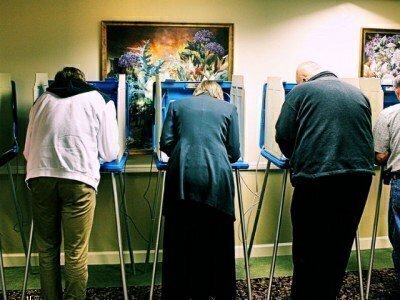The Supreme Court, taking on another significant controversy over voting rights, agreed on Tuesday to clarify the power of states to take voters off the registration rolls if they skip going to the polls in several elections. The new case from Ohio will come up for review in the court’s term starting next fall.
 At issue is an appeal by state officials seeking to defend their view that federal voter registration laws allow the states to adopt limited versions of a “use-it-or-lose-it” condition on keeping a current voter registration. The appeal has the support of 15 other states, but has drawn opposition from civil rights groups who claim that “voter purge” laws are suppressing the right to vote of many thousands of citizens.
At issue is an appeal by state officials seeking to defend their view that federal voter registration laws allow the states to adopt limited versions of a “use-it-or-lose-it” condition on keeping a current voter registration. The appeal has the support of 15 other states, but has drawn opposition from civil rights groups who claim that “voter purge” laws are suppressing the right to vote of many thousands of citizens.
A federal law passed in 1993 sought to compel states to update their voter rolls – at least for federal elections, but at the same time tried to make state registration laws work to serve that goal without purging people unfairly from the rolls. That is the National Voter Registration Act.
The U.S. Court of Appeals for the Sixth Circuit, in a divided decision by a three-judge, ruled that Ohio’s registration rolls-updating process depends too heavily upon voters’ failure to go to the polls regularly.
The Ohio law results in removal of a voter from a registration roll if that individual has not voted or updated their registration (for example, because they may have moved) over a six-year span.
Here is how it works in Ohio and in a number of other states: if the state finds that a voter’s name is on the rolls but that the individual has not cast a ballot or updated their registration for two years, it sends that voter a notice asking them to confirm their registration status.
If the voter returns the notice, then their registration is updated. But if the voter does not respond, and officials discover later that the voter did not cast a ballot in federal elections over the next four years, their registration is cancelled.
In nullifying a key part of that arrangement, the Sixth Circuit Court ruled that, since the federal law does not allow states to purge the rolls just because a voter failed to go to the polls, Ohio cannot use the failure to vote as a reason to send out the initial confirmation notice after two years of failing to vote or updating registration status.
If a failure to vote is used as a “trigger” for losing the right to vote, even the sending of a confirmation notice cannot be “triggered” by a record of non-voting, the Circuit Court majority declared.
Ohio contended, in the lower court and in its appeal to the Supreme Court, that the 1993 law and a later, 2002, law put states in a bind as they try to keep their voter rolls up to date.
The 2002 law -- the Help America Vote Act – explicitly requires states, Ohio argued, to remove a voter for failing to respond to a notice about their status and then does not vote or update registration during two federal election cycles (half the period that Ohio allows a voter to remain on the rolls even if not having voted).
The appeals court ruling, the state officials asserted, “makes it harder for states to conduct what all can agree is a critical activity – removing ineligible voters from registration lists – by removing one method for doing so.”
The state’s argument is countered by voting rights advocacy groups that the Ohio system in actual operation takes voters off the rolls even if they have not moved from one place to another and have done nothing to forfeit their registration, and thus their eligibility to vote.
The federal voter registration, those groups contended, prevents states from “systematically preventing eligible persons from exercising their right to vote for a failure to vote.”
It takes the votes of only four Justices to grant review of a new case like this one. It will take the votes of a majority of the nine Justices to overturn the appeals court ruling. The case may not come up for a hearing until early next year.
Legendary journalist Lyle Denniston is Constitution Daily’s Supreme Court correspondent. Denniston has written for us as a contributor since June 2011 and has covered the Supreme Court since 1958. His work also appears on lyldenlawnews.com.







